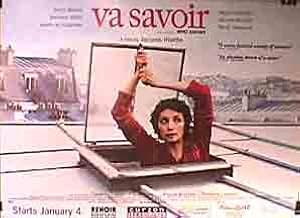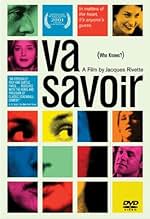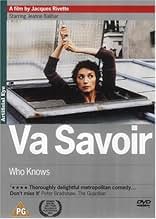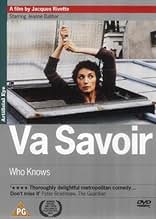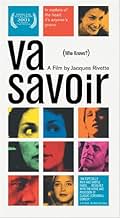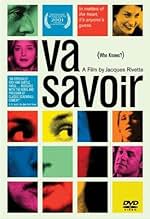Va savoir
- 2001
- Tous publics
- 2h 34min
NOTE IMDb
6,8/10
2,6 k
MA NOTE
Ajouter une intrigue dans votre langueQuick-witted, well-read cultured types revolve around each other in a delightful potpourri of theatre, romanticism and theft.Quick-witted, well-read cultured types revolve around each other in a delightful potpourri of theatre, romanticism and theft.Quick-witted, well-read cultured types revolve around each other in a delightful potpourri of theatre, romanticism and theft.
- Réalisation
- Scénario
- Casting principal
- Récompenses
- 3 victoires et 3 nominations au total
Valeria Cavalli
- Ines
- (as Valéria Cavalli)
Avis à la une
The play within a play ploy is used in Go Figure to excellent effect. The play is an eighteenth century farce performed by an Italian acting troupe visiting Paris. The farce utilizes six characters, the optimal number to engage in romantic mix-ups, flirtations, and other amorous stuff. And lo and behold, Go Figure itself contains six persons who engage in romantic mix-ups, flirtations, and crimes, both physical and of the heart.
There's the lead actress and her stage manager husband; she, who walked out on her now married ex-lover, whom she meets for the first time in three years (as well as his wife). Rounding out the six are two siblings, one a sexy young lady, the other her caddish older brother. There's jewel theft, a hunt for a missing manuscript, jealousy, and the falling in and out of love. And in the backdrop the acting troupe struggles to remains solvent.
All this is served up in, what I would call a French style. Of course I've not seen that many French romantic comedies, but I can state that were this in the hands of an American 'Hollywood' director it would be an entirely different film. And probably not nearly as good. In Rivette's hands all the action and interactions seem natural and light. There's no 'look at me' style of acting; it's almost understated. And this makes for a very enjoyable viewing that loses little on the small screen.
There's the lead actress and her stage manager husband; she, who walked out on her now married ex-lover, whom she meets for the first time in three years (as well as his wife). Rounding out the six are two siblings, one a sexy young lady, the other her caddish older brother. There's jewel theft, a hunt for a missing manuscript, jealousy, and the falling in and out of love. And in the backdrop the acting troupe struggles to remains solvent.
All this is served up in, what I would call a French style. Of course I've not seen that many French romantic comedies, but I can state that were this in the hands of an American 'Hollywood' director it would be an entirely different film. And probably not nearly as good. In Rivette's hands all the action and interactions seem natural and light. There's no 'look at me' style of acting; it's almost understated. And this makes for a very enjoyable viewing that loses little on the small screen.
Having read many of the comments of "Va Savoir" here, (admittedly mostly from the other side of the Atlantic), I was surprised by the amount of hostility towards this film.
Whilst I admit that it may have benefited from a little judicious editing, perhaps down to around two hours, this seems to me to be a well acted and entertaining slice of french life. The fact that the main characters are involved in the theatre is entirely secondary since their "real" lives depicted here are infinitely more interesting than the characters being portrayed in the Pirandello play. Perhaps that was the point.
There are enough sub-plots and unanswered questions relating to the fully rounded, three dimensional characters to keep the average viewer engrossed for the length of the film. They do not conform to stereotypes and it is not possible to pigeon-hole them. We find out much more about them as the film progresses. This is a film about people, their interwoven histories, and the formation of new relationships.
Jeanne Balibar's performance, seemed to me, complex and mature. Initially, I found her portrayal cold and unemotional, but this I believe was intentional and as the film progresses, she is revealed as a complicated and enigmatic character, capable of intense emotions but also of granting sexual favours just to create a diversion.
There is also a fine performance from Sergio Castellitto as Ugo, entirely convincing, except perhaps in his refusal to bed the truly delicious "Do" played by a ravishing Hélène de Fougerolles, (surely another French actress destined for greatness). Indeed, Jacques Rivette seems to have nurtured excellent performances all round.
Whilst this is not a perfect film, it offers more than enough to warrant a few short hours of your time. This is a fine French film, which will remain in your memory for sometime to come and compared with much of Hollywood's current output, is a mature and thought-provoking piece of film making. Open a good bottle of red Bordeaux and settle down with its cinematic equivalent.
Whilst I admit that it may have benefited from a little judicious editing, perhaps down to around two hours, this seems to me to be a well acted and entertaining slice of french life. The fact that the main characters are involved in the theatre is entirely secondary since their "real" lives depicted here are infinitely more interesting than the characters being portrayed in the Pirandello play. Perhaps that was the point.
There are enough sub-plots and unanswered questions relating to the fully rounded, three dimensional characters to keep the average viewer engrossed for the length of the film. They do not conform to stereotypes and it is not possible to pigeon-hole them. We find out much more about them as the film progresses. This is a film about people, their interwoven histories, and the formation of new relationships.
Jeanne Balibar's performance, seemed to me, complex and mature. Initially, I found her portrayal cold and unemotional, but this I believe was intentional and as the film progresses, she is revealed as a complicated and enigmatic character, capable of intense emotions but also of granting sexual favours just to create a diversion.
There is also a fine performance from Sergio Castellitto as Ugo, entirely convincing, except perhaps in his refusal to bed the truly delicious "Do" played by a ravishing Hélène de Fougerolles, (surely another French actress destined for greatness). Indeed, Jacques Rivette seems to have nurtured excellent performances all round.
Whilst this is not a perfect film, it offers more than enough to warrant a few short hours of your time. This is a fine French film, which will remain in your memory for sometime to come and compared with much of Hollywood's current output, is a mature and thought-provoking piece of film making. Open a good bottle of red Bordeaux and settle down with its cinematic equivalent.
Some years ago Sophie Marceau explained her move to Hollywood in more or less the following terms: I am tired of doing the same French movies where all in all there is a love triangle and in the end the three of them have dinner together. Well, Va savoir is exactly that kind of movie. It is more complicated because there are actually four love triangles, but yes, they all have a cake to share in the end; all the six people who were involved in the triangles. So nothing new here. The good thing, however, are the characters. Except for the brother-and-sister duo who are kind of stereotypical and possibly present the spectator with the cliché of male and female libertine Parisians, the other two couples arouse our curiosity with their insufficiencies: Camille is a little too absent-minded to be completely sane, Pierre is a typical academic dork who falls into furies of sophisticated frustration, Ugo visibly carries the burden of his unattractive appearance and compensates for it with his thick Italian accent, while Sonia obstinately tries to keep to the level of those intellectual pricks and prove how much more she knows about real life. This is a good melodrama if you like the genre. I do, and I liked it. Marceau probably wouldn't.
The film's heroine, Camille, a French stage actress left Paris three years ago and found success in Torino, Italy where she became a lead actress for the theater company. She also became a lover of Ugo, a famous stage director. She returns back to Paris with Ugo and his company to act in Italian as a main character in Pirandello's "As You Desire Me", the play that explores the mysteries of identity and memory. While in Paris, Camille confronts her past life and Pierre, the man whom she loved and still can't forget. I found Camille's character (as played by Jeanne Balibar, the stage actress and a dancer) very interesting. She may not be likable in a beginning but she is talented and every character in the movie after watching her performing at the stage leaves with the feelings that they've witnessed something very special. Camille changes as the movie progresses and in the end she becomes like a sister or close friend to both Celine and Julie. Her every movement, gesture, the way she walks, smiles, turns her head, speaks in two languages changing the timbre of her voice are true marvels to watch and to listen to.
Ugo tries to find in the Paris libraries the lost but existing play by the Italian dramatist of 18th century, Carlo Goldoni and is helped by an intelligent and beautiful young student, Dominique or Do and they both seem to have developed some special feelings for each other. Dominique has a half-brother, Arthur who is in love with Sonja, a new woman in Pierre's life or is he in love with Sonja's exquisite jewelry? Do and Arthur have a mother, Madame Desprez who has inherited the library of the rare and priceless old books but she does not sell them, she keeps them as a memory of her first husband. Sonja, Pierre's girlfriend seems to bring the peace and happiness in Pierre's life after Camille was gone but she, too, had a mystery in her rather wild past for which a marvelous ring, an object of Arthur's desire serves as a reminder.
I like "Va savoir" a lot - it is so well constructed and absolutely Rivettesque and it made me smile all the time. It is long (as usual for Rivette's films) but elegantly relaxed. It moves well with its own wonderful pace and we enjoy leisure walkings and spend time with many old and rare books. We feel longing that is in the air - all six characters desire something and someone. We notice once again how much Rivette likes his characters sitting on the park bench where the magic events begin happening to them. We go through many wonderful sequences, ironic, dramatic, and lyrical and in the end we are awarded by the finale which is truly grand and theatrical in the best sense. After all the movie could be viewed as Rivette's love letter to theater. Va Savoir? Who knows?
Ugo tries to find in the Paris libraries the lost but existing play by the Italian dramatist of 18th century, Carlo Goldoni and is helped by an intelligent and beautiful young student, Dominique or Do and they both seem to have developed some special feelings for each other. Dominique has a half-brother, Arthur who is in love with Sonja, a new woman in Pierre's life or is he in love with Sonja's exquisite jewelry? Do and Arthur have a mother, Madame Desprez who has inherited the library of the rare and priceless old books but she does not sell them, she keeps them as a memory of her first husband. Sonja, Pierre's girlfriend seems to bring the peace and happiness in Pierre's life after Camille was gone but she, too, had a mystery in her rather wild past for which a marvelous ring, an object of Arthur's desire serves as a reminder.
I like "Va savoir" a lot - it is so well constructed and absolutely Rivettesque and it made me smile all the time. It is long (as usual for Rivette's films) but elegantly relaxed. It moves well with its own wonderful pace and we enjoy leisure walkings and spend time with many old and rare books. We feel longing that is in the air - all six characters desire something and someone. We notice once again how much Rivette likes his characters sitting on the park bench where the magic events begin happening to them. We go through many wonderful sequences, ironic, dramatic, and lyrical and in the end we are awarded by the finale which is truly grand and theatrical in the best sense. After all the movie could be viewed as Rivette's love letter to theater. Va Savoir? Who knows?
6seeb
This is an interesting, yet at times boring movie. It is not boring necessarily because you get bored while watching, but it's because you don't get attached to any of the characters for a long time. There are two stories going on. They are intertwined. The story of the play that we don't understand much about, except seeing the possible alterego of our main woman character and also of course there is the story of these six individuals, three men and three women. They are all in search of something literally or symbolically.
While watching this film, you might pause, have some dinner, go back, continue. The phone rings, you forget about it, start watching again, and fall asleep. The next morning, you wake up, decide to watch, you think of looking it up at IMDb and you just do that. Throughout the film, there is a huge amount of feeling going back and forth, but we all (together with the director, the movie cast and the crew) watch it all happen as if it's not even happening. In a way, the movie is too French-cool, which also makes it unique. This attachment I am talking about, because of its non-existence, you might just end up finishing the film in three days, but maybe the more crucial thing is that no matter what, you do wanna go back and see what's haunting you. You can't let go. In a way, that's exactly what the main character feels. She can't let go either. There is something calm about her, something serene. We are not impressed at first, but slowly she becomes a goddess of determination and genuineness. Yet, there is something that triggers her mind and it steals her peace.
Luckily as time goes on, we observe her internal-peace-movement. In this sense, this movie is either very successful and it gave me the exact feeling, or maybe I am overly empathetic : )
It did take me 3 days to watch, with numerous interruptions of daily life, and I even stopped watching now and started writing this review.
Yes, I do not know the ending yet. Do watch it, if you are someone who does a lot of thinking about the complexities of interpersonal relationships (especially about romantic ones), but make sure you are patient, interested, and ready to think.
While watching this film, you might pause, have some dinner, go back, continue. The phone rings, you forget about it, start watching again, and fall asleep. The next morning, you wake up, decide to watch, you think of looking it up at IMDb and you just do that. Throughout the film, there is a huge amount of feeling going back and forth, but we all (together with the director, the movie cast and the crew) watch it all happen as if it's not even happening. In a way, the movie is too French-cool, which also makes it unique. This attachment I am talking about, because of its non-existence, you might just end up finishing the film in three days, but maybe the more crucial thing is that no matter what, you do wanna go back and see what's haunting you. You can't let go. In a way, that's exactly what the main character feels. She can't let go either. There is something calm about her, something serene. We are not impressed at first, but slowly she becomes a goddess of determination and genuineness. Yet, there is something that triggers her mind and it steals her peace.
Luckily as time goes on, we observe her internal-peace-movement. In this sense, this movie is either very successful and it gave me the exact feeling, or maybe I am overly empathetic : )
It did take me 3 days to watch, with numerous interruptions of daily life, and I even stopped watching now and started writing this review.
Yes, I do not know the ending yet. Do watch it, if you are someone who does a lot of thinking about the complexities of interpersonal relationships (especially about romantic ones), but make sure you are patient, interested, and ready to think.
Le saviez-vous
- AnecdotesSergio Castellitto dubbed himself in the french version, while Jeanne Balibar dubbed herself in the italian's.
- GaffesA child and a bicycle in the background disappears between shots in the park.
- Citations
Cammille B.: I really should calm down. I knew this would happen. It was coming. I should have said no, not a chance, not Paris. Even three years later, I can't.
- Versions alternativesRivette's original 220 minute cut called Va Savoir+ premiered on 24 April 2002 and ran for seven weeks at only one theater, the Cinéma du Pantheon in Paris, selling a total of 1,734 tickets. Rivette said that Va Savoir+ was a completely different film than Va Savoir, the major difference being lengthy scenes of the actors performing Pirandello's "Come tu mi vuoi" instead of just rehearsals. The director stated that in the longer version, Pirandello's play is "another character" in the film.
- ConnexionsFeatured in Tempus fugit, manet amor: Jacques Rivette à propos de Va savoir (2008)
Meilleurs choix
Connectez-vous pour évaluer et suivre la liste de favoris afin de recevoir des recommandations personnalisées
- How long is Who Knows??Alimenté par Alexa
Détails
- Date de sortie
- Pays d’origine
- Site officiel
- Langues
- Aussi connu sous le nom de
- Va savoir+
- Lieux de tournage
- Sociétés de production
- Voir plus de crédits d'entreprise sur IMDbPro
Box-office
- Montant brut aux États-Unis et au Canada
- 907 323 $US
- Week-end de sortie aux États-Unis et au Canada
- 43 010 $US
- 30 sept. 2001
- Montant brut mondial
- 2 039 644 $US
- Durée2 heures 34 minutes
- Couleur
- Mixage
- Rapport de forme
- 1.85 : 1
Contribuer à cette page
Suggérer une modification ou ajouter du contenu manquant

Lacune principale
By what name was Va savoir (2001) officially released in Canada in English?
Répondre






